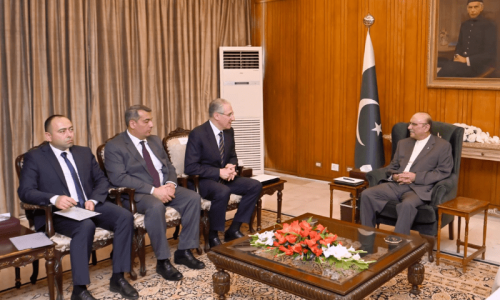TOKYO: Donors pledged $4.5 billion for rebuilding efforts in Sri Lanka on Tuesday, but their tying the release of these funds to the resumption of peace talks highlights both the fragility and the high stakes involved in efforts to end the country’s two-decade-old war.
While the meeting was a success in terms of drawing loans and grants from foreign governments and donor institutions for the next four years, how much it will prod the Tamil Tiger rebels back into the peace process — from which they stopped participation in April — remains the big question.
“Daunting and formidable tasks lie ahead,” Gamini L Peiris, chief negotiator for the Sri Lankan government in the peace talks, acknowledged at a press conference on Tuesday.
“We will find innovative ways to look after all the people of our country. We will work for the development of the north-east (Tamil areas most affected by the war) in partnership with the LTTE,” Sri Lankan Prime Minister Ranil Wickremesinghe said, pledging a relevant role for the rebels there.
Yasushi Akashi, spokesman for the Japanese government and its representative on peace-building, said the conference is an incentive for all sides to move ahead and resume talks. “We have created the material conditions to start work. Everything depends on the efforts of the Sri Lankan people.”
“The international community is placing a bet on Sri Lanka. It is up to Sri Lanka whether it can go ahead or not,” said US Deputy Secretary of State Richard Armitage.
Despite last-minute appeals by international donors to the Tiger rebels, formally known as the Liberation of Tamil Tigers Eelam (LTTE), its leaders stood firm on their boycott of the two-day donors’ meeting hosted by the Japanese government.
In suspending participation in the talks in late April, the rebels protested their exclusion from another donors’ meeting that month in the United States. Likewise, they say that government’s rehabilitation of the northeast, the areas most affected by the war, has been too slow.
They want an interim administration that would have autonomy in the north and east, a move that would put reconstruction of the country’s Tamil-majority areas under the hands of the LTTE.
More than 65,000 people have been killed and more than 800,000 displaced in the ethnic conflict, which centres on minority Tamils’ demand for their own homeland in the majority Sinhalese country.
A ceasefire has been in place for more than a year now. The current peace process began with talks in September 2002 and six rounds of negotiations since then.
In his keynote address, Wickremesinghe acknowledged that “shortcomings in the implementation process are one of the key impediments in our negotiations with the LTTE” and promised to create a provisional structure to take charge of administrative aspects of the transitional process to give a role to the LTTE.
But Armitage, whose government had not invited the Tigers to the April meeting in Washington because the LTTE remains classified as terrorist organization, also took a hard line. “We are calling on the LTTE to resume negotiations immediately. The conference shows the international community did not succumb to the blackmail of the LTTE,” he said.
Japan co-hosted the Tokyo Conference on Reconstruction and with the United States, Norway and the European Union. Participants from 51 countries and 22 international organizations attended, along with civil society representatives invited by the Japanese government.
Apart from pledging funds for Sri Lanka, the donors’ Tokyo Declaration on Reconstruction and Development of Sri Lanka also listed 10 guidelines that link substantial progress in the peace process to the new aid pledges.
At the forefront of the checklist is full compliance with the 16-month ceasefire, effective delivery mechanisms for assistance in the north and east, the participation of a Muslim delegation, and the implementation of measures under an action plan, supported by the United Nations Children’s Fund (UNICEF), to stop the underage recruitment of rebels.
The declaration was based on a needs assessment plan under the guidance of multilateral lending institutions, one that called for $2.8 billion annually, mostly for the north-eastern part of Sri Lanka.
Japan pledged $1 billion to be disbursed over three years, putting it at the top of the list of country donors. The United States followed with $54 million. The Norwegian government pledged $3 million, mostly for the north and east.
The Manila-based Asian Development Bank promised $1 billion and the World Bank, $200 million per year. Among others, the European Union committed $293 million over a three-year period. Other countries like Thailand and South Korea made pledges, though the figures were not available.
Non-governmental organizations welcomed the aid but said that more than money itself, what is needed is closer cooperation for local people to ensure successful results.
The large aid pledges in Tokyo are an “incentive to the peace process” but donors must take care that financial means are accompanied by transparency, progress on human rights, and equity, said Pakiasothy Saravanamuttu, director of the Centre of Policy Alternatives.
If the Tamil Tigers have been less than happy with the progress of the peace talks, the Sri Lankan government is under fire from the other end of the political spectrum as well — even here in Tokyo.
On Sunday, Wickremesinghe was confronted by members of the Japan-Chapter of the Janata Vikumuthi Party, an extremist Sinhala group that is also represented in Sri Lanka’s multiparty opposition.
The party members, some of whom were arrested by the police, accused Wickremesinghe of giving in too easily to Tamil demands. —Dawn/The InterPress News Service.














































Dear visitor, the comments section is undergoing an overhaul and will return soon.